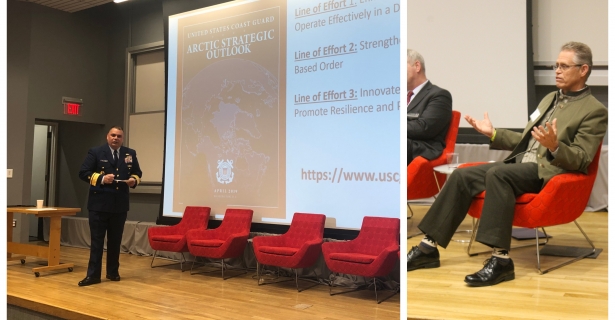The ninth annual Fletcher Arctic Conference was held on February 7 and 8, 2020, at Tufts University. The theme of this year’s conference was The Kaleidoscope of Arctic Security: The Evolution of Hard, Soft and Human Security in the Arctic. Eighty people, including students and members of the Fletcher community, attended the day and half-long conference.
The conference kicked off on Friday evening with a special address by Dr. Dalee Sambo Dorough, Chair of the Inuit Circumpolar Council-Alaska (ICC), and an alumna of The Fletcher School. Dr. Dorough reflected on her time at Fletcher and also spoke of her work with the ICC, providing a much-needed indigenous perspective to pressing issues of human security faced by Inuit and other indigenous communities in the Arctic. Dr. Dorough’s talk was followed by a panel on Environmental Sustainability in the Arctic. The evening ended with a networking mixer which gave an opportunity to conference attendees and panelists to mingle in an informal setting.
Our program on Saturday began with an address by Fletcher Dean Rachel Kyte, who urged the audience to listen to the “sound of the Arctic” in order to better understand this remote and starkly beautiful region of the world, and to encourage our policies to be informed by its regional needs. Dean Kyte was followed by a panel on Technology and Development in the Arctic, which included a lively discussion on how innovation plays a role in the economic development of the region, and the implications of that. Our keynote address for the conference was presented by U.S. Coast Guard Rear Admiral Andrew Tiongson, commander of the Coast Guard’s First District covering the Northeastern United States.
The afternoon session included two more panels, one on Challenges and Opportunities to Human Security in the Arctic and the other on Acceptable International Behavior in the Arctic. The diversity of panelists contributed to a wide array of perspectives that complemented, and at times, challenged each other. A theme was balancing the great power competition of Europe, Russia, China, and the United States with the impact on the indigenous communities of the Arctic, who are far too often overlooked.
The conference continues a tradition of leadership in the area of Arctic studies that The Fletcher School has long been a part of and furthers. Due to the interdisciplinary nature of Arctic issues, there is a lot of overlap with a wide number of topics taught at Fletcher. The conference stimulated conversations and provoked discussions that encouraged attendees to connect the Arctic across a variety of interests and personal backgrounds.

